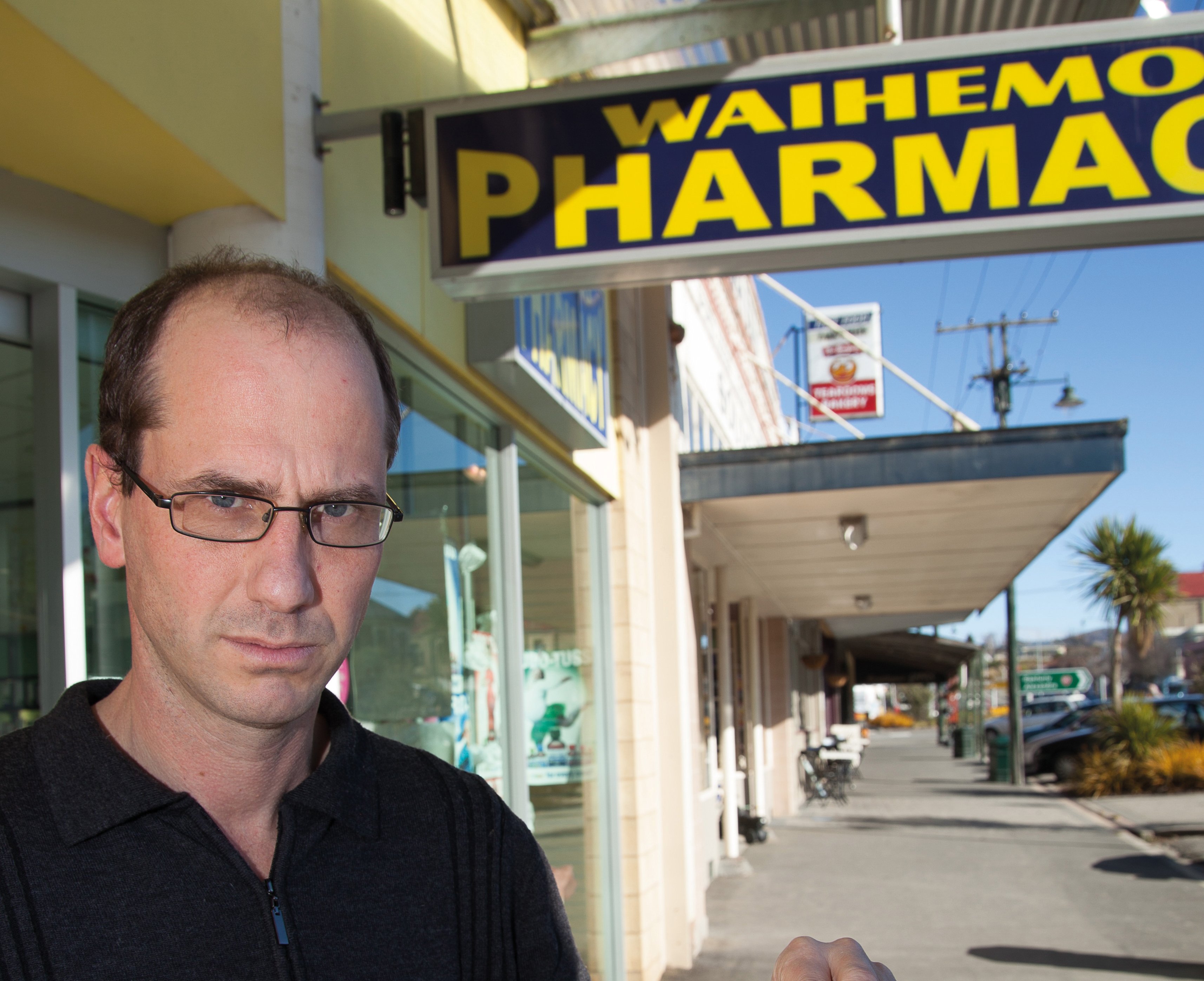Academic pharmacist Nataly Martini provides key information on Helicobacter pylori pathophysiology, diagnosis and evidence-based treatment strategies to enhance patient outcomes
The pharmacist who stopped unannounced audits
The pharmacist who stopped unannounced audits

Documents released under the Official Information Act show a single South Island pharmacy owner who had enough was the catalyst for the controversial unannounced audits programme being halted and put under review. Jonathan Chilton-Towle investigates
Pharmacists nationwide breathed sighs of relief on 27 January when they heard Medicines Control’s unannounced audits had been halted.
Unannounced audits were first introduced in 2017 and proved unpopular with pharmacists, a common complaint being that the audits put staff under significant pressure, especially if they occur during a busy time when the pharmacy is shortstaffed, and therefore the audits themselves could lead to unsafe practice.
Officially, the audits stopped because the formation of Te Whatu Ora created an opportunity to review and standardise processes between the agencies involved.
But Adrian Graamans, who owns Waihemo Pharmacy in the tiny rural Otago town of Palmerston, reckons the real reason is his long-running battle with Medsafe over the audits.
Medsafe has previously denied Mr Graamans’ allegations when questioned by Pharmacy Today. But documents released under the Official Information Act reveal that Mr Graamans’ four-year refusal to engage with the unannounced audit process and eventual threats to close his pharmacy over it did result in his situation – and the entire audit framework – being discussed by top pharmacy managers within the Ministry of Health and Te Whatu Ora, ahead of the audits being stopped in January.
“I was motivated simply by the fact that it was wrong [of Medsafe] to expect pharmacists in my position to stop and deal with their shit
Mr Graamans, a sole-charge pharmacist, became frustrated after receiving an unannounced audit in May 2018. He describes the corrective actions he was told to take as “nitpicking”, and several emails released show that Te Whatu Ora did not consider that the compliance breaches identified created a risk to the services provided by Waihemo Pharmacy.
Mr Graamans says he is happy to do a regular audit, where he has enough notice to arrange staffing cover or if the cover isn’t possible, to notify his community he will be shutting down his pharmacy for the duration of the audit to avoid the disruptions to services it causes.
He decided to stop engaging with the process as a protest and, between 2018 and mid-2022, mostly cut off communication with Medsafe.
I was motivated simply by the fact that it was wrong [of Medsafe] to expect pharmacists in my position to stop and deal with their shit,” he says.
After not complying following the 2018 audit, he was audited for a second time in December 2020 and again refused to engage afterwards.
The situation continued, and then in August last year, Medsafe gave Mr Graamans a deadline to comply or risk losing his pharmacy licence. This was later extended to 12 October 2022. Previously, his licence was renewed several times despite the ongoing non-compliance.
Around that time, Mr Graamans was talking with a friend familiar with contractual law, who suggested he look at his contract. Mr Graamans did, and was surprised by what he found.
According to clause 14(1) of the Integrated Community Pharmacy Services Agreement (ICPSA), pharmacies must be given at least 10 days’ notice that an audit will happen. Mr Graamans says this means unannounced audits are breaching the contract.
The contract also states in clause 14(2) that less than 10 days’ notice may be given if Te Whatu Ora has reasonable grounds to believe that the ICPSA has been breached or that the delay would unreasonably prejudice the audit.
Mr Graamans says Medicines Control, which is contracted to do audits on behalf of Te Whatu Ora, uses this clause to justify unannounced audits. However, he says it is not sufficient that the auditor just suspects the pharmacy may be breaching some audit criteria. They must provide specifics, and he has had legal advice that supports his view.
In August, Mr Graamans sent an email to Medicines Control asking that, in future, he be given 10 days’ notice before an auditor comes to his pharmacy. He threatened to close his pharmacy if this was not agreed to.
He believes Te Whatu Ora and the ministry have also had legal advice that the audits breached the contract due to a conversation he had with Te Whatu Ora Southern pharmacy advisor Andrew Bary.
“The 10 days’ notice was negotiated all those years ago on the basis that you simply can’t charge into pharmacies and expect them to drop everything. It’s wrong, and it was never meant to be like that,” Mr Graamans says.
On 14 September, Rowena Fu, senior advisor Medicines Control, wrote to Mr Graamans to advise him his pharmacy licence would not be renewed due to his lack of compliance. Ms Fu also rejected the request for 10 days’ notice for audits.
Mr Graamans wrote back, saying this was “non-negotiable” and that he would close permanently if his request was not granted by 12 October.
The threat to close the pharmacy prompted a flurry of internal emails discussing the situation within the ministry and Te Whatu Ora.
On 12 October, Medicines Control team leader Alastair Shum emailed Mr Graamans and informed him that Medsafe would not agree to his request but that his next audit (a full quality audit that notice would be given for) would be conducted by June 2023.
The following day, an email addressed only as being from “Medicines Control” was sent to Mr Graamans, informing him that all future audits conducted under the ICPSA would be given the 10 days’ notice specified in the contract.
Emails released under the OIA show the email’s wording was discussed by ministry staff beforehand. An email Medicines Control manager Michael Haynes sent to former TAS primary care and pharmacy manager Janice Donaldson, Mr Shum and ministry pharmacy manager Billy Allan on 13 October shows it was chosen to communicate that the ICPSA clause only applies to audits conducted under the ICPSA and not to audits conducted to meet regulatory requirements under the Medicines Act, which Mr Haynes’ email agrees require a “demonstrated regulatory need”.
Several more email chains show internal discussions within Te Whatu Ora and the ministry, although any legal advice the documents may have contained or referenced has been redacted to protect the independence of professional advice.
On 9 September 2022, Mr Bary emailed Te Whatu Ora Southern funding manager Rory Dowding to recommend that Te Whatu Ora Southern seek legal advice on the unannounced audits due to Mr Graamans’ situation.
Mr Bary wrote that “…from a contractual perspective, it would appear reasonable that a provider should receive at least 10 days’ notice of the date and time of any audit/component of an audit conducted on behalf of Te Whatu Ora unless there is either a suspected breach of the agreement, fraud or reasonable belief that that notice period would unreasonably prejudice audit integrity”.
He stated Medicine Control’s position was that unannounced audits were permissible under the contract on “the basis that any notice provides the opportunity for a provider to prepare for the audit, prejudicing the outcome” does not align with another section of the ICPSA, Section A.2 (1)(c), which requires Te Whatu Ora to act “in good faith, in an environment of trust, openness, and transparency”.
Mr Bary also wrote it could be fairly argued that if an unannounced audit was being done under clause 14(2) then the auditor should be able to demonstrate why this was being done for the provider involved.
Then, on 20 September, Mr Bary sent another email to Ms Donaldson, Jane Dawson, also of TAS, and Mr Haynes, where he wrote that “our stance is that 10 days’ notice should be the default for any audit or component of an audit conducted on behalf of Te Whatu Ora Southern”.
An email from Ms Donaldson to Mr Haynes and Mr Allan on 3 October details a meeting the trio had to discuss Medicine Control’s audit framework. They apparently discussed if the Waihemo Pharmacy situation could set a precedent for other pharmacies and appear to have concluded that it could “on a case-by-case basis”.
Ms Donaldson contacted ministry chief pharmacy advisor Andi Shirtcliffe, Te Whatu Ora Nelson Marlborough general manager strategy, primary and community Cathy O’Malley, Mr Bary and former Te Whatu Ora Southern executive director planning and funding Andrew Lesperance about Waihemo Pharmacy and the audit framework on 7 October, suggesting that the audit framework be reviewed.
“With the Pae Ora Act and Te Whatu Ora’s establishment, there is an opportunity to reactivate discussions with Medicines Control (that have been in abeyance for some years) about the agencies’ respective audit programme requirements,” she wrote, adding that any change to the ICPSA terms would need to be agreed through the National Annual Agreement Review (NAAR) process, which may not be supported.
Ms Shirtcliffe wrote back that it “would be ideal to ensure consistency of understanding and intent” on pharmacy audits and also stated she supported creating an ability for the audit framework to be flexible for small and rural pharmacies while not compromising safe service provision.
Ms O’Malley replied that, in her experience, unannounced audits were only used if there were a specific reason to think it was necessary.
“I also have some sympathy for a small pharmacy under pressure being able to do their day job and be audited at the same time, so being able to ensure appropriate staff on the day does seem reasonable.
“Maybe we need a discussion more broadly with Medicines Control to understand why they take this approach?”
On 18 October, Ms Donaldson shared a draft paper on pharmacy audits with Mr Bary, Mr Lesperance and Te Whatu Ora Southern primary care manager Adam O’Bryne for feedback before it was sent to Te Whatu Ora’s pharmacy leads.
The paper released is almost entirely redacted, but in one non-redacted bullet point, it says:
“The pharmacy audit strategy has been brought into focus at a national level after a sole rural pharmacy raised concern at the unannounced audits performed by Medicines Control in part on behalf of Te Whatu Ora.”
The paper mentions a response coordinated by TAS, and while mention of the contents of this are redacted, Ms Donaldson writes that “these findings will require a change to the way that the National Pharmacy Quality Audits are delivered on behalf of Te Whatu Ora”.
Mr Graamans eventually agreed to undertake some minor corrective actions after meeting with Mr Bary and did not close his pharmacy.
He again threatened to close his pharmacy in December after reading in Pharmacy Today that unannounced audits had continued at other pharmacies despite what had happened in his situation.
“When I got a whiff of that in your article in December, I wrote them another letter and told them that mid-January I’m closed again unless you stop doing it [unannounced audits] for everybody.”
On 27 January, Te Whatu Ora’s interim director, primary, community and rural, national commissioning Emma Prestidge, sent a letter informing pharmacy contract holders that unannounced pharmacy quality audits had been paused until further notice.
Mr Graamans believes his threats to close proved so effective because his pharmacy “defines essential”. His is the only pharmacy between Dunedin and Oamaru, and he dispenses about 400 prescriptions daily.
“They need me here doing that, and I figured that out.”
As of 17 May, Mr Graamans has still not been notified when his full audit will occur and suspects he might be the first pharmacy in the country only to get 10 days’ notice ahead of a full audit.
He also says he is still waiting for an apology from Medicines Control.
Pharmacy Today approached Medsafe for comment and was sent a joint statement from Medsafe group manager Chris James and Te Whatu Ora group manager, primary health care system improvement and innovation Adeline Cumings.
According to the statement, the pharmacy audit programme is administered by Medsafe on behalf of Te Whatu Ora to assure that pharmacy services are delivered in accordance with regulatory, contractual and professional obligations and align with the public safety intent of the pharmacy licensing framework.
The review is part of “a continuous quality improvement approach".
“Pharmacy Quality Audits are conducted in accordance with the Pharmacy Quality Audit Framework, including both notified and unannounced audits,” the statement says.
“Medsafe and Te Whatu Ora reject any allegation that audits have not been conducted in alignment with the ICPSA.”









